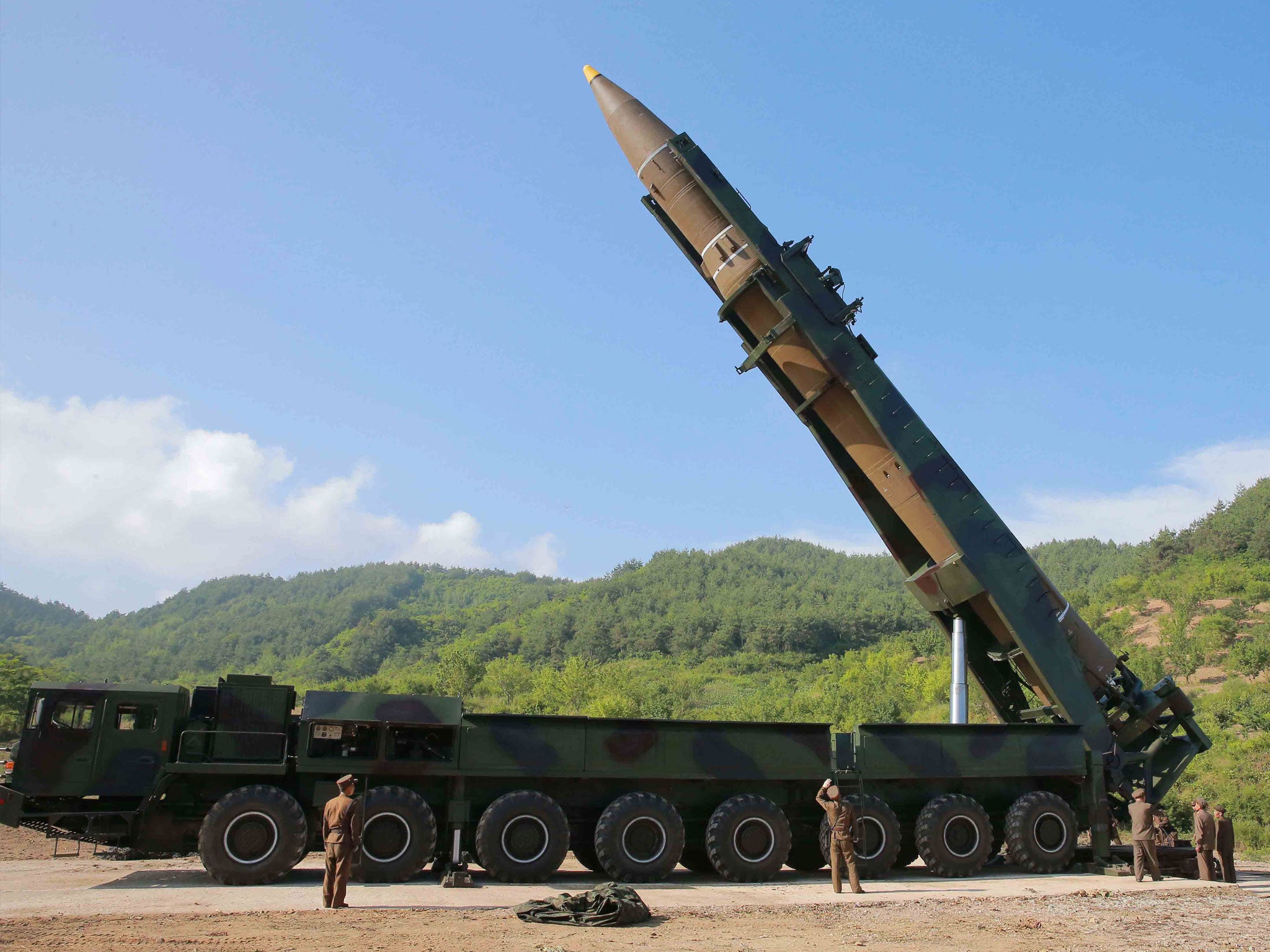North Korea’s missile test could turn Japan away from pacifism
Where Prime Minister Shinzo Abe is seeking reform of Japan’s pacifist constitution, greater insecurity could conceivably strengthen his hand in doing so

Your support helps us to tell the story
From reproductive rights to climate change to Big Tech, The Independent is on the ground when the story is developing. Whether it's investigating the financials of Elon Musk's pro-Trump PAC or producing our latest documentary, 'The A Word', which shines a light on the American women fighting for reproductive rights, we know how important it is to parse out the facts from the messaging.
At such a critical moment in US history, we need reporters on the ground. Your donation allows us to keep sending journalists to speak to both sides of the story.
The Independent is trusted by Americans across the entire political spectrum. And unlike many other quality news outlets, we choose not to lock Americans out of our reporting and analysis with paywalls. We believe quality journalism should be available to everyone, paid for by those who can afford it.
Your support makes all the difference.North Korea’s most recent weapons test, in which a Hwasong-12 missile was fired over Japan, marks the latest stage of an escalating crisis in East Asia. But the crisis is, to an extent, where it has always been: the regime of Kim Jong-un is pursuing the capacity to launch miniaturised nuclear weapons attached to intercontinental missiles with a range capable of hitting the continental United States.
This capability represents two aspects of strategy for Pyongyang. First, it legitimises the regime’s authority domestically by presenting it as defending the country from an American and South Korean threat it has talked-up, vilified and defined itself against for decades.
Second, it helps to secure the regime’s survival by making intervention by outside actors potentially catastrophic, having observed what happened to Saddam Hussein and Muammar Gaddafi.
The self-interested rationality of weapons-based freedom from interference has a specific logic, but the temperament of North Korea’s leader appears questionable, and the mutually reinforced war of words with the US president raises worrying questions about miscalculation and over-reaction.
Bombast is stock in trade for North Korea and has been for decades. That President Trump has met firebrand rhetoric with more of the same, leading to a tit-for-tat dynamic of escalation, is deeply concerning. Beneath the war of words, North Korea appears on course to achieve its aims, and is widely expected to achieve its nuclear ambitions within the next two years.
The key question is whether the simmering conflict can be damped down, creating space for dialogue before a mistake is made, or the North passes the finishing line. Pragmatism and finesse appear at a premium.
There are several overlapping dynamics at work. On the Korean Peninsula, there is the North-South conflict – the armistice signed in 1953 ending the Korean War was a ceasefire rather than a peace agreement, so the North and South remain technically at war.
In wider terms, there is competition between China and the US. The United States has 30,000 troops stationed in the South and the two are military allies. In the North, China is both a key economic relationship for Pyongyang, and has a defence agreement in place.
Beijing’s support for the hermit kingdom is fundamentally strategic. In a scenario in which the regime in Pyongyang collapses or is removed, China is concerned about the flow of refugees across its borders, and is deeply opposed to a unified Korea run from Seoul as a US ally on its doorstep. It tacitly supports the North to prevent the latter scenario, but the prominence of Kim Jong-un’s demonstrations of strength make that position increasingly costly for China’s reputation.
Beyond this is Japan. Its proximity to Pyongyang makes the threat more pronounced than it may be for the residents of California, but this hasn’t bred the public defiance through indifference sometimes seen in Seoul. Attitudes appear more openly jittery in Japan, as the sirens which announced the test indicate.
Public attitudes in Japan are heavily anti-nuclear, so Tokyo remains unlikely to pursue a weaponised nuclear capability in response. But where North Korea’s actions have been actively linked by the Trump administration to a ‘grand bargain’ with China, threats to Japan’s security have wider implications that feed already contentious relations between Beijing and Tokyo. Where Prime Minister Shinzo Abe is seeking reform of Japan’s pacifist constitution, greater insecurity could conceivably strengthen his hand in doing so.
For President Trump, the policy review completed shortly after he came to office highlighted the severity of the situation in North Korea. If that pressing need for action has been seized on as a chance to look tough, the lesson is being forcibly taught that things are not that simple, will not stand still and require a considered approach that so far appears lacking.
James Hannah is Assistant Head of Chatham House’s Asia Programme
Join our commenting forum
Join thought-provoking conversations, follow other Independent readers and see their replies
Comments